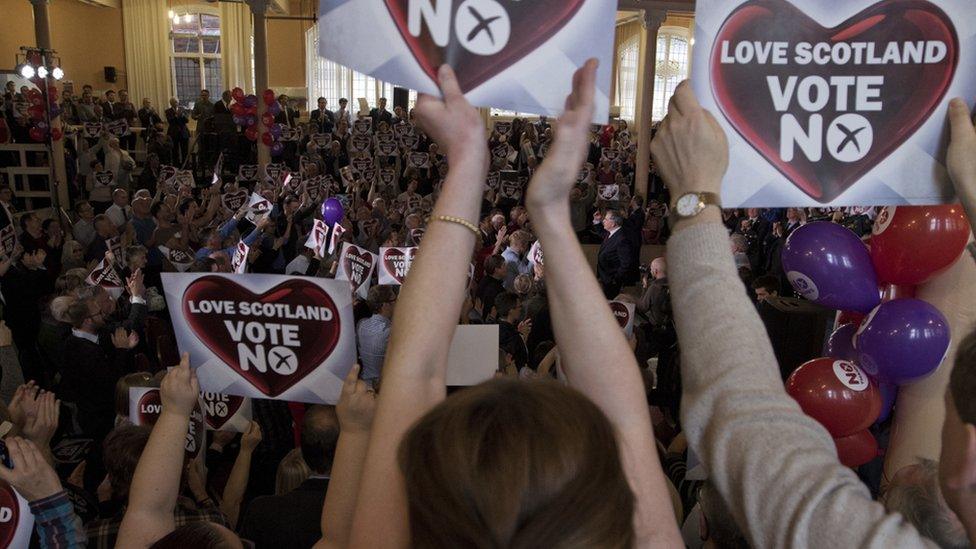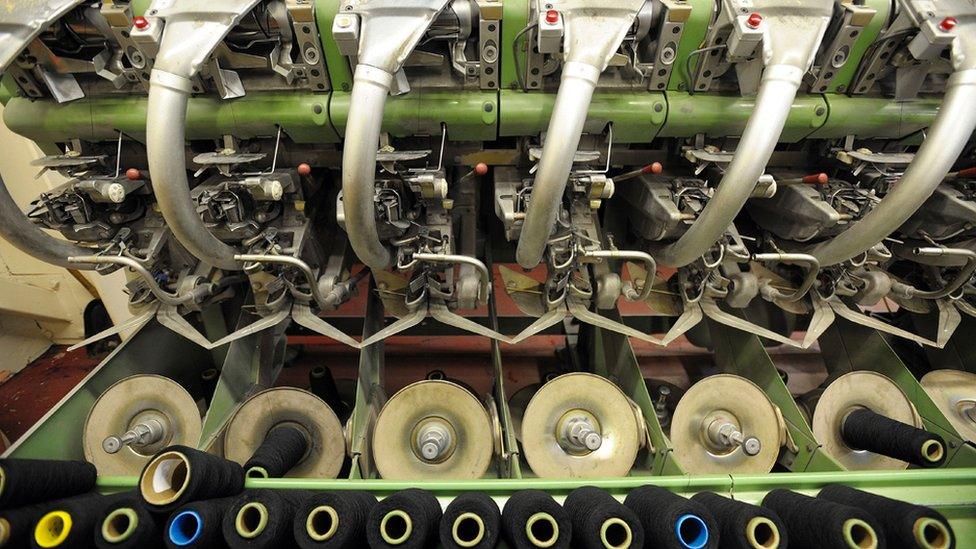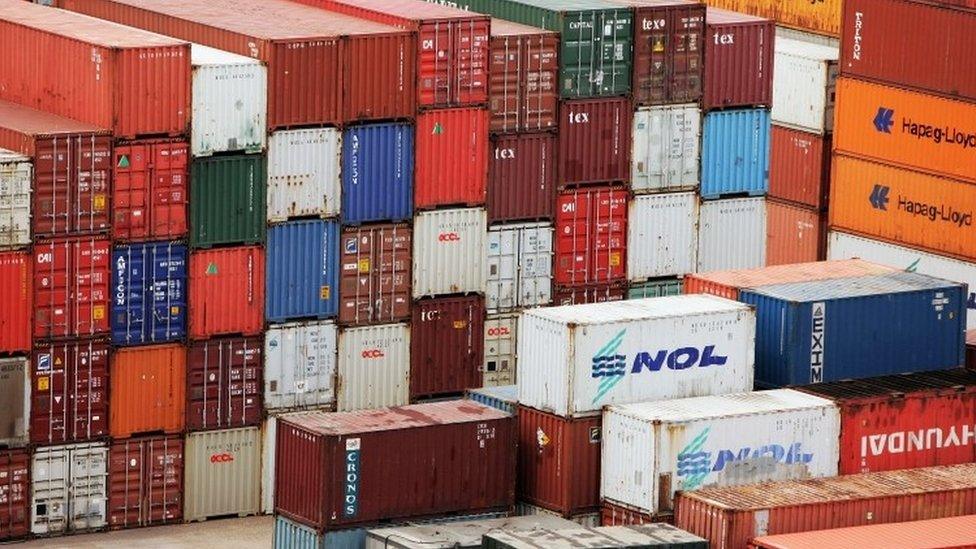What role could the economy play in indyref2?
- Published

A combination of Brexit and heightened expectations of another Scottish independence referendum have brought economic arguments back to the fore.
Some arguments will be familiar from 2014, but important factors have changed: the rest of the UK is no longer 'the status quo' option.
Choices made at Westminster would force an iScotland into stark choices between its biggest market, to the south, and a European future. But do the economic arguments matter?
From one constitutional logjam to another: Brexit's first stage may have been resolved by the election, but the question of Scotland's constitutional future is now hard to ignore.
If there is to be another referendum on Scottish independence, what role would the economy play this time?
It was, arguably, the decisive issue in giving 'no' the majority of votes in 2014. It certainly dominated much of the long debate leading up to that vote.
The Fraser of Allander Institute has published its own take in the wake of the Westminster election, external, along with its regular commentary on the economy.
The commentary comes with its regular forecast: weak growth in Scottish economic output this year, of 0.9%, but picking up next year, to 1.3%, and 1.4% for the two years after that.
This is based on the expectation that a clearer path to Brexit has been opened by last week's election result. Business could start investing in the expectation of a smooth transition out of Europe.
But if the government heads back to the threat of a "no deal" departure at the end of 2020, the Strathclyde University forecast says to prepare for a "sharp slowing" of the economy.
Familiar arguments on independence

On that question of a Scottish independence referendum, the institute's director, Prof Graeme Roy, who used to work at the heart of the Scottish government's economics team, argues that some arguments would be familiar.
One side will say Scotland has the resources and the potential to be matching the growth rates and lower income inequalities of smaller European nations.
The other will say that the United Kingdom offers economic security, and a pooling of resources to support public spending at current levels, including social security.

Those for independence will welcome the observation that there is no longer a "status quo". Leaving the European Union is risky for the economy. So is independence. A referendum could be fought as a battle between two unknown outcomes, so there would be a more level playing field.
After Brexit, the UK could become better or worse off, depending on policy decisions and business activity.
It could take some time (no-one knows how long) before we find out which it is to be. And the transition could be costly and painful for those industries tied into European markets and supply chains.
Exactly the same could be said of Scotland after independence. It could help Scotland become more prosperous than it would otherwise have been. Or it could do the reverse. It depends on the arrangements for departing the UK, and on the policy choices made at Holyrood.
A more challenging option

That much should be a lot clearer to voters after three-and-a half years of grinding through the minutiae of the Brexit process. Constitutional change is complex: its outcomes unclear.
In the case of Brexit, it's put a lot of business investment on hold, or simply frightened it away. So heading down a similar path of potential economic dislocation could change voter perceptions of independence if there's another Scottish ballot.
In 2014, the case for independence came with the assertion that Scotland could quickly become established as a member state of the European Union.
That would put it within a single Europe-wide market and a customs union, making trade seamless between Scotland and the rest of the UK, and also between Scotland and the rest of the European Union.
There would be no tariffs, no border posts, and they would share common regulatory standards, decided by agreement of 29 EU members, meeting in Brussels.
But with England and Wales out of the single market and customs union, EU membership becomes a more challenging option for Scotland.
'Scotland may face a stark choice'

Depending on the extent of divergence decided at Westminster, Scottish firms trading with the rest of the UK - which buys twice as much from Scotland as the whole of the rest of the world - would be under pressure to align instead with the regulatory framework set in Brussels.
That sounds technical. In practical terms, think of farm output. Westminster may choose to align its trade with the USA, which has different regulations on genetic modification of crops and food safety standards (chlorine-washed chicken, anyone?) and trade is heavily constrained by tariffs.
Or take financial services, at present completely integrated across the UK. If the City of London is required to take its lead from the USA or shifts its focus to trade with Hong Kong and Singapore, the EU could resist that, requiring Scotland to weaken that cross-Cheviot integration.
As Prof Roy puts it: "Scotland may face a stark choice between aligning to the EU trading bloc or the UK bloc, with implications for trade and migration."

We should now be more aware, following the Brexit debate, that such a choice is rarely, if ever, made on the terms of the smaller partner. Trade negotiations are not between equals, and outcomes reflect that.
The Strathclyde University economist adds that the public finances have not gone the way of the independence movement. The Scottish government's own numbers estimating tax raised in Scotland, and public spending, continue to show an unsustainably large gap.
In 2014, a careful choice of boom years for offshore oil and gas made it look like that would close the gap. It's not been looking that way in the past five years. There are billions of pounds in oil tax revenue that could flow annually into the Scottish exchequer under independence, but they are far from closing the fiscal gap.
The SNP case has shifted to treating offshore oil and gas as a windfall rather than a fiscal necessity. And with climate change a rising priority, the pressure will surely grow for the industry to be wound down.
A shift towards radical change
According to Prof Roy, the most significant difference with the 2014 campaign is a shift from a continuity narrative to one of quite radical change.
Five years ago, Alex Salmond and the 'yes' campaign could portray independence as requiring very little change, at least of the type that would be disruptive or threatening to people's finances.
We were reassured that the currency would remain the same, the border would be open, and Scotland and England would share regulation of finance and much else besides.
That's not so easy to argue after Brexit. The SNP's new currency is already a more complex offer: use sterling, but without any joint controls, get ready for Holyrood to create a Scottish currency, and from there, decide if it's in the country's interests to join the euro.
That's harder to sell on the doorstep, particularly one owned by a resident with a mortgage, pension and savings all in sterling.
Do the economic arguments matter?

For what it's worth, I'll add two further factors. One was barely addressed in 2014, and still isn't clear: to balance the public finance books and to make Scotland more prosperous, where does economic growth come from?
The case was made five years ago, and again by the SNP's Sustainable Growth Commission, led by Andrew Wilson, that Scotland could and should grow faster, matching similar European nations.
But the case has been less clear about how that can be achieved, and what trade-offs would have to be addressed. A lower tax regime, for instance? How would productivity be boosted more effectively? Employment law tilted towards the demands of employers or those of trade unions? What level of public ownership of strategic industries?
Finally, the Brexit experience has presented us with a big question of whether the economic arguments matter.
Presented with expert economic opinion that warned of the impact of departing the EU, Leavers simply dismissed them as scaremongering and Project Fear (a term borrowed from the 2014 Scottish campaign).
Even if there is some pain, we were being told by Leave voters that the sacrifice would be worth it to get out of Europe.
Arguments about democracy and identity trumped those about economics. And so it may turn out to be with Scottish independence.
